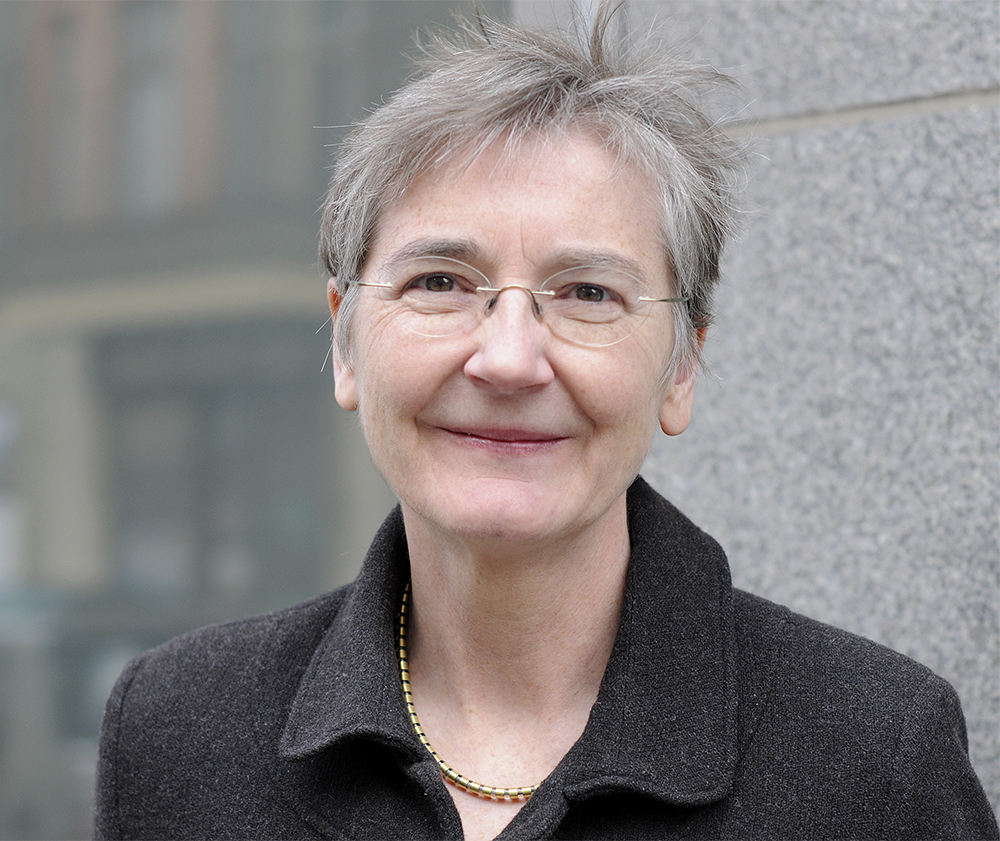Judy Dempsey
{
"authors": [
"Judy Dempsey"
],
"type": "commentary",
"blog": "Strategic Europe",
"centerAffiliationAll": "",
"centers": [
"Carnegie Endowment for International Peace",
"Carnegie Europe"
],
"collections": [
"EU Integration and Enlargement"
],
"englishNewsletterAll": "",
"nonEnglishNewsletterAll": "",
"primaryCenter": "Carnegie Europe",
"programAffiliation": "",
"programs": [],
"projects": [],
"regions": [
"Europe",
"Western Europe",
"Germany"
],
"topics": [
"EU",
"Foreign Policy"
]
}
Source: Getty
Judy Asks: Is German Dominance Over?
A selection of experts answer a new question from Judy Dempsey on the foreign and security policy challenges shaping Europe’s role in the world.
A selection of experts answer a new question from Judy Dempsey on the foreign and security policy challenges shaping Europe’s role in the world.
Roland FreudensteinPolicy director at the Wilfried Martens Centre for European Studies
This question sounds a bit like the proverbial “Have you stopped beating your wife (or husband, for that matter)?” Germany has not dominated Europe. It has, in the last five years and driven by its economic strength in the eurozone crisis, made a couple of valiant attempts at leadership. Some were really successful, such as the one in reaction to Russia’s aggression in Ukraine. Putting together an EU sanctions coalition against Russia was a major feat achieved by listening to others, big and small, and by pursuing leadership from the middle ground (because there were hawkish Easterners on one side and the dovish Club Med on the other). Ditto in the austerity debate, albeit with more grumbling from more countries.
But on refugees, since September 2015, none of these elements of prudence has been visible. Instead, Germany has maneuvered itself into a corner from which it is harder and harder to gather followers. And leadership without followers is no leadership. That said, Germany still has the EU’s strongest economy, and Chancellor Angela Merkel’s prudence in matters from sound fiscal policies to keeping Britain in the EU is still a factor. On security, however, Germany is still lamentably failing.
On the whole, Germany can lead if it observes a couple of simple rules. If it doesn’t, Europe will suffer.
István HegedűsChairman of the Hungarian Europe Society
The German political elite was always reluctant to become Europe’s sheriff, although many EU partners pushed Chancellor Angela Merkel to accept leadership. When she finally did so to manage ongoing European crises, her opponents started to speak about the ugly legacy of German history and the moral imperialism of the biggest EU member state.
Germany exhibits dominance, maybe, but not hegemony. The EU’s institutional setup and its multilevel governance system ensure democratic decisionmaking processes: none of the member states can lead without sufficient support from its allies. Germany was not definitively isolated at the March 7 EU-Turkey meeting, but Berlin alone could not push through its political concept for an agreement to tackle the refugee crisis. Moreover, a fear that the EU is losing sight of human rights, which are still important for the pro-European liberal public in Turkey and the EU, raised serious concerns about the German-Turkish deal, especially in the European Parliament.
There are certain European political leaders in office—and others waiting in opposition to break through at coming elections—who would be enthusiastic to see the decline of German influence at the European level. Merkel’s team should be careful not to forget to involve like-minded European political actors when trying to save Europe’s future based on its original values.
Denis MacShaneFormer UK minister for Europe
German Chancellor Angela Merkel made a mistake not in the act of generosity but in the politics of generosity. Unusually, she broke all the ground rules of German, European, and international politics in place since the 1950s.
These rules can be summed up in one word: consultation. Merkel consulted no one when she appeared to unilaterally invite millions of Syrian and other refugees fleeing persecution, civil war, Islamist terror, and poverty, or huddling in transit camps and shanty towns in Turkey, Greece, Jordan, and Africa, to come to rich Northern Europe.
She did not consult the German parliament, Brussels, or, most importantly of all for Germany, the country’s immediate neighbors. She seemed to expect all would follow her act of generosity and open their borders to tens of thousands of non-European incomers at a time of tension over Islamist ideology and violence.
The EU will work its way through this error of German policy, as will Germany. The March 13 elections in three German regions produced a majority of votes for pro-refugee politics, even if headlines focused on the right-wing Alternative for Germany (AfD), a single-issue party that will not be able to govern even if it wins some seats in regional parliaments.
As long as Germany stays rich, it will be the dominant power in the EU. But Merkel’s era of dominance is now coming to an end—and, indeed, may already be over.
Gianni RiottaMember of the Council on Foreign Relations
Germany has been the hegemonic power in Europe since the end of the Cold War in 1989. Yet, Berlin has played a rather modest role in world affairs—a very small one indeed if compared with the country’s economic size and might. Shying away from military intervention and without a permanent seat on the UN Security Council, Germany plays a quiet role of advice and cooperation but outside Europe is not the clearinghouse it should be. Chancellor Angela Merkel and her predecessors Gerhard Schröder and Helmut Kohl shared a very timid vision of their country’s role in global affairs, focused on leading Europe.
After the 2008 financial crisis, the ensuing eurozone debt crisis, and the refugee flow that resulted from the war in Syria, this clubby, relaxed attitude was no longer enough. Germany had to lead, period. Merkel tried and failed. Her generous plan to open the country’s doors to refugees did not convince German voters and terrified the hapless leaders of the Old Continent.
Germany has to reassess its worldview and design a long-term strategy, accepting once and for all that World War II is over and that Europe needs a trusty, fair, democratic boss.
Alison SmaleBerlin bureau chief of the New York Times
Over the past decade, German Chancellor Angela Merkel has gradually become—by both fault and design—Europe’s go-to leader. She has been weakened in recent months by a response to the refugee crisis that has won her plaudits both at home and abroad. But that response has also stirred strong resistance in her own conservative camp and from European governments that just months earlier were willing allies.
Germany still has economic and political clout, but Merkel—or a German leader of the future—will have to build new ties to reassert the country’s dominant role.
Ulrich SpeckSenior fellow at the Transatlantic Academy
No, because without German dominance there is no leadership at all in the EU. Nobody else besides Berlin is currently willing and capable to develop and shape joint solutions to joint challenges.
The refugee crisis will be solved at the EU level, because every government understands that the Schengen system of open borders is at stake. As during the eurozone crisis, there will be a tough struggle over the contours of the solution. But it is clear that no Schengen member wants to sacrifice the achievement of open borders for the risk of putting into motion a process of EU disintegration.
As with the eurozone turmoil and the Ukraine conflict, with the refugee crisis the EU is morphing into a much more political entity: governments are dealing jointly with issues that deeply affect their countries’ policies and identities. This is a fascinating, ambitious, and rarely fully understood process orchestrated mainly by German Chancellor Angela Merkel.
Bernd UlrichDeputy editor in chief of Die Zeit
No, quite the opposite. German dominance in the EU is increasing and assuming different forms in the process. With Ukraine, it was the capacity to exert soft power; with the eurozone crisis, the capacity to enforce; with the refugee influx, the capacity to prevent.
Since summer 2015, German Chancellor Angela Merkel has prevented a racist or regressive or EU-splitting response to the refugee crisis. Even now, while some countries with weak nerves are resorting to unnecessary and inhumane border closures, people in need can still make it into the EU. Preventing the worst and buying the EU some time is the mark of true leadership. At present, only Germany has the two attributes needed for that: strong power and a sound philosophy.
One must realize just how great is the force of this refugee-triggered historical rendezvous with global justice, of this settling of some accounts between the first and third worlds. The U.S. public is being bewitched by a racist response to the question of global justice, while Europe—not least thanks to Germany’s government—is eluding this temptation for now.
Incidentally, this third variant of German dominance is a positive experience for the entire EU because this time, Germany must act from a position of relative weakness. In the long run, this will boost acceptance of German leadership.
About the Author

Nonresident Senior Fellow, Carnegie Europe
Dempsey is a nonresident senior fellow at Carnegie Europe
- Europe Needs to Hear What America is SayingCommentary
- Babiš’s Victory in Czechia Is Not a Turning Point for European PopulistsCommentary
Judy Dempsey
Recent Work
Carnegie does not take institutional positions on public policy issues; the views represented herein are those of the author(s) and do not necessarily reflect the views of Carnegie, its staff, or its trustees.
More Work from Strategic Europe
- Taking the Pulse: Can European Defense Survive the Death of FCAS?Commentary
France and Germany’s failure to agree on the Future Combat Air System (FCAS) raises questions about European defense. Amid industrial rivalries and competing strategic cultures, what does the future of European military industrial projects look like?
Rym Momtaz, ed.
- Macron Makes France a Great Middle PowerCommentary
France has stopped clinging to notions of being a great power and is embracing the middle power moment. But Emmanuel Macron has his work cut out if he is to secure his country’s global standing before his term in office ends.
Rym Momtaz
- How Europe Can Survive the AI Labor TransitionCommentary
Integrating AI into the workplace will increase job insecurity, fundamentally reshaping labor markets. To anticipate and manage this transition, the EU must build public trust, provide training infrastructures, and establish social protections.
Amanda Coakley
- Can Europe Still Matter in Syria?Commentary
Europe’s interests in Syria extend beyond migration management, yet the EU trails behind other players in the country’s post-Assad reconstruction. To boost its influence in Damascus, the union must upgrade its commitment to ensuring regional stability.
Bianka Speidl, Hanga Horváth-Sántha
- Taking the Pulse: Can the EU Attract Foreign Investment and Reduce Dependencies?Commentary
EU member states clash over how to boost the union’s competitiveness: Some want to favor European industries in public procurement, while others worry this could deter foreign investment. So, can the EU simultaneously attract global capital and reduce dependencies?
Rym Momtaz, ed.









